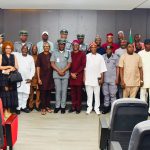National Single Window a Paradigm Shift : Renowned Scholar, Francis Omotosho Makes World-class Presentation at MAJAN Summit

National Single Window a Paradigm Shift : Renowned Scholar, Francis Omotosho Makes World-class Presentation at MAJAN Summit
…Lauds President Tinubu on single window initiative

A renowned Scholar, and the Registrar, NAGAFF Academy, Francis Idowu Omotosho, has described National Single Window project as the highest standard of excellence in public service delivery, with the capacity to reduce bottlenecks, revenue leakages; simplify clearing processes; enhance trade transparency and increase government revenue.
Francis Omotosho made these details known while presenting a well researched and comprehensive lecture, at a seminar with the theme; ‘Transforming Trade Facilitation – The Role of National Single Window in Enhancing Economic Efficiency’, organised by Maritime Journalists Association of Nigeria (MAJAN), at Rockview Hotel, Apapa Lagos.
Speaking on the topic : ‘Enhancing Transparency and Accountability in Trade; The Roles of National Single Window (NSW) in Combating Corruption’, he stressed that National Single Window (NSW) if fully implemented will attract foreign direct investments to Nigeria; create jobs for the citizens and support overall economic growth now and in the long-term.

Mr Omotosho, who is also a Senior Forwarder of Nigeria, stated:
“If fully implemented, NSW will transform Nigeria’s trade sector, enabling traders to comply easily with government regulations, thereby reducing delays at ports.”
His lecture : “Single Window is a concept adopted under the International Maritime Organisation (IMO) Convention on Facilitation of International Maritime Traffic (FAL), the World Customs Organidation (WCO) International Convention on simplification and harmonisation of Customs procedures, (Kyoto Convention), and the World Trade Organisation (WTO) Trade facilitation agreement, which requires all government agencies regulating shipping and international trade logistics systems to use a single digital platform to share and exhange information.
“It also permits the traders or transporters to submit or lodge all the data, information and documents needed for determining admissibility of the ship or cargo in a Standardised format only ONCE to all the regulatory agencies on that single digital portal, or platform, to be controlled by a Central Unified interface lead agency among the agencies.
“Also, the Single Window platform allows the traders to view all interactions among the regulatory agencies without regard for internal divisions.”
Scholar Omotosho explained further : “There are three major categories of Single Windows. The first one is Single Window for foreign trade clearance formalities that takes care of all administrative formalities public and private. This is required for foreign trade operations.
“The second type is Single Window for Logistics Coordination, which is often located in a port. This aims at processing the flow of information related to shipment and mainly involving logistics and Customs stakeholders. Single Window for Logistics exclusively deals with logistics, notably in the port facilities.”
He continued : “The third type is National Integral Single Window, which is the National Single Window that we are talking about. This is a combination of Single Window for foreign trade clearance formalities and Single Window for Logistics Coordination.”
He pointed out : “The current government under President Bola Tinubu has emphasised that NSW initiative is a pivotal component of his administration’s economic reforms aims to streamline trade processes, reduce bottlenecks, and enhance transparency within Nigeria’s trade environment.
“The NSW is a game changer that will revolutionise the way trade is conducted in Nigeria”.

Francis Omotosho emphasised that successful NSW implementation in Nigeria requires the cooperation of all relevant stakeholders, as well as the commitment of government agencies; such as Customs and other regulatory agencies.
He mentioned the need for an appropriate legal framework and model for the NSW project, adding that NSW is not just a digital platform for trade but a paradigm shift in public governance.
In his recommendations, the renowned Scholar called for the law on protection of personal data, law on electronic transactions, law on cybercrime, and law on data transmission. He recommended regional integration with adoption of a single African currency.


 Exceptional Performance : Ogun 11 Command hits N15.2bn revenue collection in 4 months, achieves 40% increase
Exceptional Performance : Ogun 11 Command hits N15.2bn revenue collection in 4 months, achieves 40% increase  26 years of democracy : Senate President harps on responsible journalism
26 years of democracy : Senate President harps on responsible journalism  Comptroller Olomu upscales innovation in trade facilitation at Apapa port
Comptroller Olomu upscales innovation in trade facilitation at Apapa port  Recognition for a Stellar Performer : NIWA MD bags ICON of Diligence in Service Merit Award
Recognition for a Stellar Performer : NIWA MD bags ICON of Diligence in Service Merit Award  Unraveling underlying reasons why empty containers litter Nigerian port space
Unraveling underlying reasons why empty containers litter Nigerian port space 



